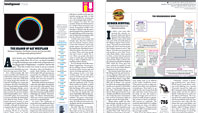
1. In last week’s cover story, Mark Levine investigated the closure of St. Vincent’s Hospital and what it portends for hospitals across the city (“St. Vincent’s Is the Lehman Brothers of Hospitals,” October 25). Many former employees of St. Vincent’s came to nymag.com to comment. “I can attest that this is a well-researched and accurate report on many of the events that brought about the death of a hospital,” wrote a former St. Vincent’s doctor. “It was one of the story lines that the rise and fall of HIV was a major contributor to the demise. Quite a commentary on our health-care system that keeping people healthy turns into a failure.” “I am convinced this is a must-read article,” added a former internist at St. Vincent’s. “Mark Levine focused on the much bigger picture, very appropriately. St. Vincent’s is the canary in the coal mine, and he got it, and laid it out step-by-step. This is outstanding work that rises above the particular issues of SVH, and yet he still establishes the Department of Health and Commissioner [Richard] Daines as accountable for the hospital’s closing. It should be read, studied, and disseminated.” Others also aimed their ire at the health commissioner. “Daines is apparently committed to the ‘creative-destruction’ model of capitalism,” wrote one commenter. “I believe he would be hard-pressed to name evidence of creation under the current system, unless he includes the creation of personal fortunes on the backs of diverse, underserved populations of New York City.”
2. Daines himself wrote in to challenge the article’s assertion that in 2008 New York hospitals operated at a 6 percent loss. “Mark Levine’s expansive look at hospitals in New York City effectively highlights the many challenges local hospitals face. While no one could argue that hospitals in New York as a whole are strong financial performers, we must disagree with Mr. Levine’s reporting that in 2008 New York hospitals ‘operated at a 6 percent loss.’ Using audited financial statements and excluding hospitals that closed during the year as well as the municipal hospital system (with its substantially different financial basis), the actual operating margin for New York voluntary hospitals in 2008 was basically break even—no mark of health, but a world away from a 6 percent loss and pretty typical of the tough [economic] environment.” Levine responds: “There are many ways to calculate hospital financial data, and Daines chooses a method that casts the health of New York’s hospitals in the best imaginable light. The 6 percent loss that the city’s hospitals suffered in 2008 can indeed be made to look less dire by excluding from the tally the city’s municipal hospitals and those hospitals that were on their way to shutting down. But the overall state of New York’s hospitals remains indisputably grim. Between 1998 and 2008, the city’s network of ‘voluntary’ hospitals posted losses in nine years, and the municipal system showed losses six times. It’s true that 2008 was an unusually challenging year, but in New York’s hospital world, modest gains—not steep losses—are the anomaly. There is little doubt that New York’s hospitals will be forced to transform the way they do business, shedding hidebound and inefficient ways, if they are to remain functional. The open question is the extent to which allowing market forces to reshape hospitals, as Daines favors, will threaten or improve the health of the patients who depend on them.”

3. Chris Rovzar’s “Intelligencer” post on the disconnect between increasing acceptance of homosexuality and the recent string of bullying-related suicides and hate crimes (“The Season of Gay Whiplash,” October 25) polarized readers. “This is a letter-perfect description of how progress is achieved. Two steps forward, one back,” wrote the bloggers at 365gay.com. “You have to be it in for the long haul. Can’t expect to enjoy the freedom you are fighting for. The work is done for those who follow us.” “There is too much of an emphasis on the ‘gay’ to what has been occurring lately,” opined a nymag.com commenter. “Are some getting tortured more based on their sexual preference? No. They are just getting paid more attention to among the many people who face being bullied every day. This issue needs to expand the spotlight of hatred and violence of everyone.” “You are comparing what could be isolated incidents of cyber-bullying or straight suicide to the entrenched and institutional degradation and discrimination against a minority group,” responded another. “Your attempt to brush gay bullying under the carpet is part of the problem.” Others took issue with Rovzar’s critique of the “It Gets Better” series of videos. “This seems a rather cynical and heartless comment. ‘Passive’ or no, the videos say/do something,” opined a commenter. Another disagreed: “It won’t get better until we attain full civil rights in this country. And even then, unless there is a resounding backlash to the bullying and cruelty, it won’t. The situation in our country is really shameful and sad, and a gloss like ‘It gets better’ is like whistling in the dark.”
Send correspondence to: comments@nymag.com